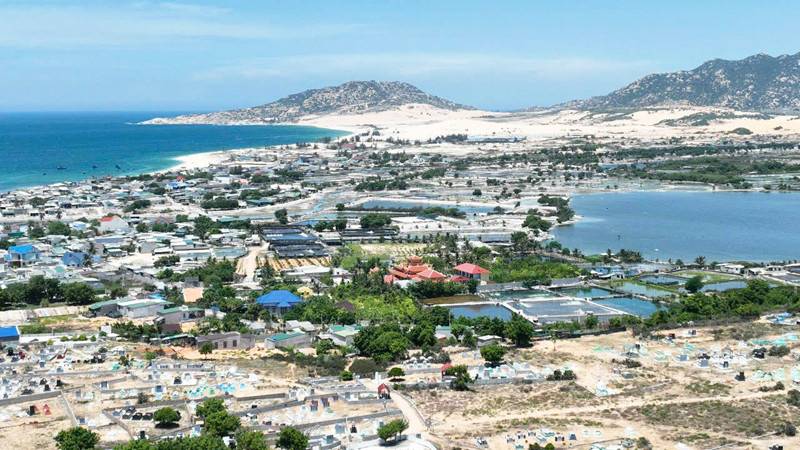
Projected site of Ninh Thuan 1 Nuclear Power Plant. (Photo: Nhan Dan Newspaper)
Dr. Tran Chi Thanh, Director General of the Vietnam Atomic Energy Institute, emphasized that nuclear power is not merely an option but an objective necessity for building a strong, prosperous, and sustainable Vietnam. Nuclear power offers clear advantages over other energy sources, such as: ensuring national energy security; serving as a key replacement for fossil fuels while reducing CO₂ emissions in pursuit of the Net Zero target; fostering the development of the country’s scientific and technological capacity, foundational industries, and high-tech sectors; and contributing to national defense and security.
At present, Vietnam faces a dual challenge: ensuring rapid economic growth—striving to surpass 8% by 2025 and move toward double digits in the 2026–2030 period—while at the same time maintaining its commitment to achieving net-zero emissions by 2050 under the Glasgow Climate Pact at COP26.
To realize this vision, the energy sector must undergo a transition. Electricity demand is expected to rise by 1.5 times to meet the needs of high-tech industries, urbanization, and consumer growth. In this context, Vietnam requires a clean, large-scale, and stable year-round energy source—making nuclear power a strategic solution.
In Vietnam, the recently passed amended Law on Atomic Energy has completed the legal framework for managing and developing the nuclear energy sector in a safe and sustainable manner. The law not only lays the foundation for the development of nuclear power but also strongly promotes the application of radiation technologies in healthcare, agriculture, and industry, thereby extending the benefits of clean technologies into everyday life.
Notably, the law introduces comprehensive provisions for managing the full life cycle of nuclear power plants — from construction and operation to decommissioning — while strengthening safeguards, ensuring safety, and addressing waste treatment. At the same time, it highlights the importance of localizing technology, training high-quality human resources, and advancing digital transformation in management. These measures reflect an approach to development that does not trade the environment for growth, but instead aims toward building a transparent and efficient nuclear ecosystem.
According to the guidance of the International Atomic Energy Agency (IAEA), ensuring safety and security in nuclear energy development must be overseen by a single, competent state authority, in compliance with international standards and covering the entire life cycle of nuclear power plants. In Vietnam, this role has been assigned to the Vietnam Agency for Radiation and Nuclear Safety (VARANS), which is responsible for independent supervision, inspection, and comprehensive control throughout the nuclear power development process.
On the technological front, Vietnam has conducted research into reactor technologies, focusing on two main directions: the Generation III+ VVER-1200 light-water reactor, with a capacity of over 1,000 MW, and small modular reactors (SMRs) with capacities under 300 MW. Both technologies have the advantage of providing clean, stable baseload power while reducing emissions across their entire life cycle, aligning with the goals of green and sustainable development.
After the revised Law on Atomic Energy was passed, the Ministry of Science and Technology, together with other relevant ministries, has been gradually completing the technical and organizational conditions necessary to ensure the safe and effective application of atomic energy. These efforts include: developing and finalizing legislation on atomic energy to establish a comprehensive and consistent legal framework for the sustainable management and development of the sector; strengthening the overall capacity of the national radiation and nuclear safety authority as well as related state management agencies; ensuring radiation and nuclear safety for the Ninh Thuan 1 and Ninh Thuan 2 Nuclear Power Plants and the research reactor in Dong Nai; advancing technology and applications of atomic energy; promoting international cooperation, technology transfer, and private investment; and modernizing the state management model for radiation and nuclear safety.
Dr. Tran Chi Thanh, Director General of the Vietnam Atomic Energy Institute, stated that the Institute will focus on research, consultation, and support in science, technology, design, and safety for the Ninh Thuan 1 and Ninh Thuan 2 Nuclear Power Plants; conducting research, design, and mastery of small modular reactor (SMR) technology; as well as researching technologies to strengthen domestic capacity in the design and manufacturing of nuclear power plant equipment, operation, maintenance, and repair. Nuclear power will be developed on the basis of advanced technology, in full compliance with international safety standards and regulations, aligned with the orientation of sustainable economic development and global integration.
Translator: Vân Ly
Share